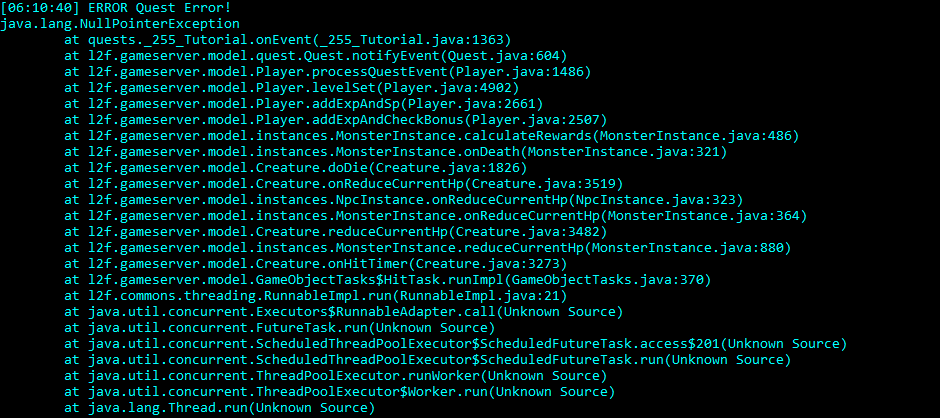-
Posts
96 -
Credits
0 -
Joined
-
Last visited
-
Feedback
0%
Content Type
Articles
Profiles
Forums
Store
Posts posted by mfg_1984
-
-
On 2/25/2020 at 8:26 PM, Freakazoid said:
The last one.
Perfect. Hahaha!
Haha i laugh to much with the last one !!
-
-
-
Very good work Chris Wee, i trust your works cause i have bought already !! Good job ;)
-
Thank you tryskell ;) fix it !
-
What mean that error ?

-
Ok fixed please delete the topic !
-
I want to disable the QuizEvent i check on eclipse this code but i don't know what i must change !?
package custom; import java.io.File; import javax.xml.parsers.DocumentBuilder; import javax.xml.parsers.DocumentBuilderFactory; import javolution.util.FastMap; import l2f.commons.util.Rnd; import l2f.gameserver.Announcements; import l2f.gameserver.Config; import l2f.gameserver.ThreadPoolManager; import l2f.gameserver.model.Player; import org.w3c.dom.Document; import org.w3c.dom.NamedNodeMap; import org.w3c.dom.Node; /** * @author Grivesky * @date 07.05.2015 * @project_name l2mythras */ public class QuizEvent { public static boolean _quizRunning; private static String _question; private static String _answer1; private static String _answer2; private static String _answer3; private static int _rightanswer; private static FastMap<Player, Integer> _players; private static int _status; private static int announced; private static AutoEventTask _task; private static String[][] _questions; private static int i = 0; private static final int STATUS_NOT_IN_PROGRESS = 0; private static final int STATUS_ASK = 1; private static final int STATUS_ANSWER = 2; private static final int STATUS_END = 3; // ---------------------------------------------------------------------------- // ------------------------------ CONFIG // -------------------------------------- // ---------------------------------------------------------------------------- // Number of questions per event private static int _questionNumber = 3; // The Item ID of the reward private static int _rewardID = 9627; // The ammount of the reward private static int _rewardCount = 1; // Wait for the first event after the server start (in seconds) 1200 private static int _initWait = 1800; // Time for answer the question (in seconds) private static int _answerTime = 10; // Time between two event (in seconds) 7200 private static int _betweenTime = 7200; public QuizEvent() { _status = STATUS_NOT_IN_PROGRESS; _task = new AutoEventTask(); announced = 0; _quizRunning = false; _question = ""; _answer1 = ""; _answer2 = ""; _answer3 = ""; _rightanswer = 0; _players = new FastMap<Player, Integer>(100); _questions = new String[93][]; includeQuestions(); ThreadPoolManager.getInstance().schedule(_task, _initWait * 1000); } private void includeQuestions() { File questionFile = new File(Config.DATAPACK_ROOT, "data/scripts/custom/QuizEvent.xml"); Document doc = null; try { DocumentBuilderFactory dbf = DocumentBuilderFactory.newInstance(); dbf.setIgnoringComments(true); dbf.setValidating(false); DocumentBuilder db = dbf.newDocumentBuilder(); doc = db.parse(questionFile); for (Node root = doc.getFirstChild(); root != null; root = root.getNextSibling()) { if ("list".equalsIgnoreCase(root.getNodeName())) { for (Node child = root.getFirstChild(); child != null; child = child.getNextSibling()) { if ("question".equalsIgnoreCase(child.getNodeName())) { int id, correct; String ask, answer1, answer2, answer3; NamedNodeMap attrs = child.getAttributes(); id = Integer.parseInt(attrs.getNamedItem("id").getNodeValue()); correct = Integer.parseInt(attrs.getNamedItem("correct").getNodeValue()); ask = attrs.getNamedItem("ask").getNodeValue(); answer1 = attrs.getNamedItem("answer1").getNodeValue(); answer2 = attrs.getNamedItem("answer2").getNodeValue(); answer3 = attrs.getNamedItem("answer3").getNodeValue(); _questions[id] = new String[] { ask, answer1, answer2, answer3, "" + correct }; i++; } } } } } catch (Exception e) { } } private class AutoEventTask implements Runnable { @Override public void run() { switch (_status) { case STATUS_NOT_IN_PROGRESS: announceStart(); break; case STATUS_ASK: if (announced < _questionNumber) { announceQuestion(); } else { _status = STATUS_END; ThreadPoolManager.getInstance().schedule(_task, 3000); } break; case STATUS_ANSWER: announceCorrect(); break; case STATUS_END: endEvent(); break; default: break; } } } // Get a random question from the quiz_event table private static void selectQuestion() { int id = Rnd.get(i) + 1; _question = _questions[id][0]; _answer1 = _questions[id][1]; _answer2 = _questions[id][2]; _answer3 = _questions[id][3]; _rightanswer = Integer.parseInt("" + _questions[id][4]); } // Announce the question private static void announceQuestion() { selectQuestion(); Announcements.getInstance().announceToAll("-----------------"); Announcements.getInstance().announceToAll("Question: " + _question); Announcements.getInstance().announceToAll("-----------------"); Announcements.getInstance().announceToAll("1: " + _answer1); Announcements.getInstance().announceToAll("2: " + _answer2); Announcements.getInstance().announceToAll("3: " + _answer3); Announcements.getInstance().announceToAll("-----------------"); _status = STATUS_ANSWER; ThreadPoolManager.getInstance().schedule(_task, _answerTime * 1000); } // Announce the correct answer private static void announceCorrect() { Announcements.getInstance().announceToAll("-----------------"); Announcements.getInstance().announceToAll("The correct answer was: " + _rightanswer); Announcements.getInstance().announceToAll("-----------------"); announced++; giveReward(); _status = STATUS_ASK; ThreadPoolManager.getInstance().schedule(_task, 5000); } private static void announceStart() { _quizRunning = true; _players.clear(); Announcements.getInstance().announceToAll("Quiz Event begins! " + _questionNumber + " questions. " + _answerTime + " secs for answer each. "); Announcements.getInstance().announceToAll("Type . and the nanswer to the chat. (Like: .1)"); Announcements.getInstance().announceToAll("Get Ready! L2zk is ready to reward you!"); _status = STATUS_ASK; ThreadPoolManager.getInstance().schedule(_task, 5000); } // Add a player and its answer public static void setAnswer(Player player, int answer) { if (_players.containsKey(player)) player.sendMessage("You alre choen an aser!: " + _players.get(player)); else _players.put(player, answer); } private static void endEvent() { _quizRunning = false; Announcements.getInstance().announceToAll("The Quiz Event is ov"); announced = 0; _status = STATUS_NOT_IN_PROGRESS; ThreadPoolManager.getInstance().schedule(_task, _betweenTime * 1000); } private static void giveReward() { for (Player p : _players.keySet()) { if (_players.get(p) == _rightanswer) { p.sendMessage("Your answer was correct! with 1 GCM!"); // p.getInventory().addItem(_rewardID, _rewardCount); p.getInventory().addItem(_rewardID, _rewardCount, null); } else { p.sendMessage("Your answer was not correct!"); } } _players.clear(); } }
-
Good job Sinister +1 !
-
Configuring MySQL on Linux
test
[client] port = 3306 socket = /var/run/mysqld/mysqld.sock default-character-set = utf8 [mysqld_safe] socket = /var/run/mysqld/mysqld.sock nice = -5 [mysqld] user = mysql pid-file = /var/run/mysqld/mysqld.pid socket = /var/run/mysqld/mysqld.sock port = 3306 basedir = /usr datadir = /var/lib/mysql tmpdir = /tmp lc-messages-dir = /usr/share/mysql innodb_flush_log_at_trx_commit = 2 #default-character-set = utf8 character-set-server = utf8 skip-external-locking bind-address = 0.0.0.0 # # * Fine Tuning # key_buffer = 512M max_allowed_packet = 16M thread_stack = 24M thread_cache_size = 8 myisam-recover = BACKUP # max_connections = 4096 #table_cache = 4096 thread_concurrency = 6 # # * Query Cache Configuration # query_cache_limit = 256M query_cache_size = 16M # # * Logging and Replication # # Both location gets rotated by the cronjob. # Be aware that this log type is a performance killer. # As of 5.1 you can enable the log at runtime! #general_log_file = /var/log/mysql/mysql.log #general_log = 1 # # Error log - should be very few entries. # log_error = /var/log/mysql/error.log # # Here you can see queries with especially long duration #log_slow_queries = /var/log/mysql/mysql-slow.log #long_query_time = 2 #log-queries-not-using-indexes # # The following can be used as easy to replay backup logs or for replication. # note: if you are setting up a replication slave, see README.Debian about # other settings you may need to change. #server-id = 1 #log_bin = /var/log/mysql/mysql-bin.log expire_logs_days = 10 max_binlog_size = 100M #binlog_do_db = include_database_name #binlog_ignore_db = include_database_name # # * InnoDB # innodb_file_per_table innodb_additional_mem_pool_size = 256M innodb_buffer_pool_size = 1024M innodb_data_file_path = ibdata1:10M:autoextend #innodb_log_buffer_size = 8M #innodb_log_file_size = 25M #innodb_log_files_in_group = 3 innodb_thread_concurrency = 12 innodb_flush_method = O_DSYNC innodb_table_locks = 0 innodb_flush_log_at_trx_commit = 0 innodb_max_dirty_pages_pct = 90 innodb_lock_wait_timeout = 120 #big-tables # InnoDB is enabled by default with a 10MB datafile in /var/lib/mysql/. # Read the manual for more InnoDB related options. There are many! # # * Security Features # # Read the manual, too, if you want chroot! # chroot = /var/lib/mysql/ # # For generating SSL certificates I recommend the OpenSSL GUI "tinyca". # # ssl-ca=/etc/mysql/cacert.pem # ssl-cert=/etc/mysql/server-cert.pem # ssl-key=/etc/mysql/server-key.pem [mysqldump] quick quote-names max_allowed_packet = 128M [mysql] #no-auto-rehash # faster start of mysql but no tab completition [isamchk] key_buffer = 64M # # * IMPORTANT: Additional settings that can override those from this file! # The files must end with '.cnf', otherwise they'll be ignored. # !includedir /etc/mysql/conf.d/
Thank you for your interest bro ! :)
-
-
How much i must put on max_connections= dude ?
-
# Other default tuning values # MySQL Server Instance Configuration File # ---------------------------------------------------------------------- # Generated by the MySQL Server Instance Configuration Wizard # # # Installation Instructions # ---------------------------------------------------------------------- # # On Linux you can copy this file to /etc/my.cnf to set global options, # mysql-data-dir/my.cnf to set server-specific options # (@localstatedir@ for this installation) or to # ~/.my.cnf to set user-specific options. # # On Windows you should keep this file in the installation directory # of your server (e.g. C:\Program Files\MySQL\MySQL Server X.Y). To # make sure the server reads the config file use the startup option # "--defaults-file". # # To run run the server from the command line, execute this in a # command line shell, e.g. # mysqld --defaults-file="C:\Program Files\MySQL\MySQL Server X.Y\my.ini" # # To install the server as a Windows service manually, execute this in a # command line shell, e.g. # mysqld --install MySQLXY --defaults-file="C:\Program Files\MySQL\MySQL Server X.Y\my.ini" # # And then execute this in a command line shell to start the server, e.g. # net start MySQLXY # # # Guildlines for editing this file # ---------------------------------------------------------------------- # # In this file, you can use all long options that the program supports. # If you want to know the options a program supports, start the program # with the "--help" option. # # More detailed information about the individual options can also be # found in the manual. # # For advice on how to change settings please see # http://dev.mysql.com/doc/refman/5.7/en/server-configuration-defaults.html # # # CLIENT SECTION # ---------------------------------------------------------------------- # # The following options will be read by MySQL client applications. # Note that only client applications shipped by MySQL are guaranteed # to read this section. If you want your own MySQL client program to # honor these values, you need to specify it as an option during the # MySQL client library initialization. # [client] # pipe # socket=0.0 port=3306 [mysql] no-beep default-character-set=utf8 # SERVER SECTION # ---------------------------------------------------------------------- # # The following options will be read by the MySQL Server. Make sure that # you have installed the server correctly (see above) so it reads this # file. # # server_type=2 [mysqld] # The next three options are mutually exclusive to SERVER_PORT below. # skip-networking # enable-named-pipe # shared-memory # shared-memory-base-name=MYSQL # The Pipe the MySQL Server will use # socket=MYSQL # The TCP/IP Port the MySQL Server will listen on port=3306 # Path to installation directory. All paths are usually resolved relative to this. # basedir="C:/Program Files/MySQL/MySQL Server 5.7/" # Path to the database root datadir=C:/ProgramData/MySQL/MySQL Server 5.7\Data # The default character set that will be used when a new schema or table is # created and no character set is defined character-set-server=utf8 # The default storage engine that will be used when create new tables when default-storage-engine=INNODB # Set the SQL mode to strict sql-mode="STRICT_TRANS_TABLES,NO_AUTO_CREATE_USER,NO_ENGINE_SUBSTITUTION" # Enable Windows Authentication # plugin-load=authentication_windows.dll # General and Slow logging. log-output=FILE general-log=0 general_log_file="NS3054556.log" slow-query-log=1 slow_query_log_file="NS3054556-slow.log" long_query_time=10 # Binary Logging. # log-bin # Error Logging. log-error="NS3054556.err" # Server Id. server-id=1 # Secure File Priv. secure-file-priv="C:/ProgramData/MySQL/MySQL Server 5.7/Uploads" # The maximum amount of concurrent sessions the MySQL server will # allow. One of these connections will be reserved for a user with # SUPER privileges to allow the administrator to login even if the # connection limit has been reached. max_connections=2000 # Query cache is used to cache SELECT results and later return them # without actual executing the same query once again. Having the query # cache enabled may result in significant speed improvements, if your # have a lot of identical queries and rarely changing tables. See the # "Qcache_lowmem_prunes" status variable to check if the current value # is high enough for your load. # Note: In case your tables change very often or if your queries are # textually different every time, the query cache may result in a # slowdown instead of a performance improvement. query_cache_size=0 # The number of open tables for all threads. Increasing this value # increases the number of file descriptors that mysqld requires. # Therefore you have to make sure to set the amount of open files # allowed to at least 4096 in the variable "open-files-limit" in # section [mysqld_safe] table_open_cache=8000 # Maximum size for internal (in-memory) temporary tables. If a table # grows larger than this value, it is automatically converted to disk # based table This limitation is for a single table. There can be many # of them. tmp_table_size=6G # How many threads we should keep in a cache for reuse. When a client # disconnects, the client's threads are put in the cache if there aren't # more than thread_cache_size threads from before. This greatly reduces # the amount of thread creations needed if you have a lot of new # connections. (Normally this doesn't give a notable performance # improvement if you have a good thread implementation.) thread_cache_size=10 #*** MyISAM Specific options # The maximum size of the temporary file MySQL is allowed to use while # recreating the index (during REPAIR, ALTER TABLE or LOAD DATA INFILE. # If the file-size would be bigger than this, the index will be created # through the key cache (which is slower). myisam_max_sort_file_size=100G # If the temporary file used for fast index creation would be bigger # than using the key cache by the amount specified here, then prefer the # key cache method. This is mainly used to force long character keys in # large tables to use the slower key cache method to create the index. myisam_sort_buffer_size=8G # Size of the Key Buffer, used to cache index blocks for MyISAM tables. # Do not set it larger than 30% of your available memory, as some memory # is also required by the OS to cache rows. Even if you're not using # MyISAM tables, you should still set it to 8-64M as it will also be # used for internal temporary disk tables. key_buffer_size=8M # Size of the buffer used for doing full table scans of MyISAM tables. # Allocated per thread, if a full scan is needed. read_buffer_size=10M read_rnd_buffer_size=1G #*** INNODB Specific options *** # innodb_data_home_dir=0.0 # Use this option if you have a MySQL server with InnoDB support enabled # but you do not plan to use it. This will save memory and disk space # and speed up some things. # skip-innodb # If set to 1, InnoDB will flush (fsync) the transaction logs to the # disk at each commit, which offers full ACID behavior. If you are # willing to compromise this safety, and you are running small # transactions, you may set this to 0 or 2 to reduce disk I/O to the # logs. Value 0 means that the log is only written to the log file and # the log file flushed to disk approximately once per second. Value 2 # means the log is written to the log file at each commit, but the log # file is only flushed to disk approximately once per second. innodb_flush_log_at_trx_commit=1 # The size of the buffer InnoDB uses for buffering log data. As soon as # it is full, InnoDB will have to flush it to disk. As it is flushed # once per second anyway, it does not make sense to have it very large # (even with long transactions). innodb_log_buffer_size=64M # InnoDB, unlike MyISAM, uses a buffer pool to cache both indexes and # row data. The bigger you set this the less disk I/O is needed to # access data in tables. On a dedicated database server you may set this # parameter up to 80% of the machine physical memory size. Do not set it # too large, though, because competition of the physical memory may # cause paging in the operating system. Note that on 32bit systems you # might be limited to 2-3.5G of user level memory per process, so do not # set it too high. innodb_buffer_pool_size=10G # Size of each log file in a log group. You should set the combined size # of log files to about 25%-100% of your buffer pool size to avoid # unneeded buffer pool flush activity on log file overwrite. However, # note that a larger logfile size will increase the time needed for the # recovery process. innodb_log_file_size=2G # Number of threads allowed inside the InnoDB kernel. The optimal value # depends highly on the application, hardware as well as the OS # scheduler properties. A too high value may lead to thread thrashing. innodb_thread_concurrency=17 # The increment size (in MB) for extending the size of an auto-extend InnoDB system tablespace file when it becomes full. innodb_autoextend_increment=64 # The number of regions that the InnoDB buffer pool is divided into. # For systems with buffer pools in the multi-gigabyte range, dividing the buffer pool into separate instances can improve concurrency, # by reducing contention as different threads read and write to cached pages. innodb_buffer_pool_instances=8 # Determines the number of threads that can enter InnoDB concurrently. innodb_concurrency_tickets=5000 # Specifies how long in milliseconds (ms) a block inserted into the old sublist must stay there after its first access before # it can be moved to the new sublist. innodb_old_blocks_time=1000 # It specifies the maximum number of .ibd files that MySQL can keep open at one time. The minimum value is 10. innodb_open_files=1000 # When this variable is enabled, InnoDB updates statistics during metadata statements. innodb_stats_on_metadata=0 # When innodb_file_per_table is enabled (the default in 5.6.6 and higher), InnoDB stores the data and indexes for each newly created table # in a separate .ibd file, rather than in the system tablespace. innodb_file_per_table=1 # Use the following list of values: 0 for crc32, 1 for strict_crc32, 2 for innodb, 3 for strict_innodb, 4 for none, 5 for strict_none. innodb_checksum_algorithm=0 # The number of outstanding connection requests MySQL can have. # This option is useful when the main MySQL thread gets many connection requests in a very short time. # It then takes some time (although very little) for the main thread to check the connection and start a new thread. # The back_log value indicates how many requests can be stacked during this short time before MySQL momentarily # stops answering new requests. # You need to increase this only if you expect a large number of connections in a short period of time. back_log=80 # If this is set to a nonzero value, all tables are closed every flush_time seconds to free up resources and # synchronize unflushed data to disk. # This option is best used only on systems with minimal resources. flush_time=0 # The minimum size of the buffer that is used for plain index scans, range index scans, and joins that do not use # indexes and thus perform full table scans. join_buffer_size=10M # The maximum size of one packet or any generated or intermediate string, or any parameter sent by the # mysql_stmt_send_long_data() C API function. max_allowed_packet=4M # If more than this many successive connection requests from a host are interrupted without a successful connection, # the server blocks that host from performing further connections. max_connect_errors=100 # Changes the number of file descriptors available to mysqld. # You should try increasing the value of this option if mysqld gives you the error "Too many open files". open_files_limit=4161 # Set the query cache type. 0 for OFF, 1 for ON and 2 for DEMAND. query_cache_type=0 # If you see many sort_merge_passes per second in SHOW GLOBAL STATUS output, you can consider increasing the # sort_buffer_size value to speed up ORDER BY or GROUP BY operations that cannot be improved with query optimization # or improved indexing. sort_buffer_size=30M # The number of table definitions (from .frm files) that can be stored in the definition cache. # If you use a large number of tables, you can create a large table definition cache to speed up opening of tables. # The table definition cache takes less space and does not use file descriptors, unlike the normal table cache. # The minimum and default values are both 400. table_definition_cache=3500 # Specify the maximum size of a row-based binary log event, in bytes. # Rows are grouped into events smaller than this size if possible. The value should be a multiple of 256. binlog_row_event_max_size=8K # If the value of this variable is greater than 0, a replication slave synchronizes its master.info file to disk. # (using fdatasync()) after every sync_master_info events. sync_master_info=10000 # If the value of this variable is greater than 0, the MySQL server synchronizes its relay log to disk. # (using fdatasync()) after every sync_relay_log writes to the relay log. sync_relay_log=10000 # If the value of this variable is greater than 0, a replication slave synchronizes its relay-log.info file to disk. # (using fdatasync()) after every sync_relay_log_info transactions. sync_relay_log_info=10000 # Load mysql plugins at start."plugin_x ; plugin_y". # plugin_load # MySQL server's plugin configuration. # loose_mysqlx_port=33060
I make a changes to boost the database but i think i can boost it more, anyone know something about that ? Thank you
Also i have this dedicated server
Intel i7-6700K OC4 Cores / 8 Threads4.4 GHz / 4.7 GHz
64 GB DDR4 2400 MHz2 x 480 GB SSD -
working +1 :)
-
Client crash probably comes due to too high number of characters in the HTM. That's up to the layout designer to think about it (he added numerous font color and images). If you got a full scheme and switch to a full skills set you probably will end with one.
I reworked Tryskell buffer for next revision (363) btw :
- data is stored on XML rather than complicated config.
- Paging system, no scrolling needed (and no client crashes possible until you put font and table everywhere).
- cutted panels amount (2 lesser) to make it easier to use and 20% of core code dissapeared too.
- Skills got name and description.
- Oldschool design.
- No blinking effect for the whole buffer HTMs.



---
As free share, you could benefit it when 380 will come.
waiting.... :D
-
το εβαλα τελος τελος μεσα στα townzone.xml και δουλευει ! +1
-
perfect i fix it dude thank you :)
-
I use l2acis i do all the steps and i stuck here , any ideas please ?[javac] D:\workspace 10\aCis_gameserver\java\net\sf\l2j\gameserver\handler\VoteHandler.java:24: error: package net.sf.l2j.commons.concurrent does not exist[javac] import net.sf.l2j.commons.concurrent.ThreadPool;[javac] ^[javac] D:\workspace 10\aCis_gameserver\java\net\sf\l2j\gameserver\handler\VoteHandler.java:28: error: cannot find symbol[javac] import net.sf.l2j.gameserver.model.World;[javac] ^[javac] symbol: class World[javac] location: package net.sf.l2j.gameserver.model[javac] D:\workspace 10\aCis_gameserver\java\net\sf\l2j\gameserver\handler\VoteHandler.java:45: error: cannot find symbol[javac] for (L2PcInstance player : World.getInstance().getPlayers())[javac] ^[javac] symbol: variable World[javac] location: class VoteHandler[javac] D:\workspace 10\aCis_gameserver\java\net\sf\l2j\gameserver\handler\VoteHandler.java:148: error: cannot find symbol[javac] for (L2PcInstance actualchar : World.getInstance().getPlayers())[javac] ^[javac] symbol: variable World[javac] location: class VoteHandler[javac] D:\workspace 10\aCis_gameserver\java\net\sf\l2j\gameserver\handler\VoteHandler.java:158: error: cannot find symbol[javac] ThreadPool.schedule(new tzvotetask(player), Config.TIME_TO_VOTE * 880);[javac] ^[javac] symbol: variable ThreadPool[javac] location: class VoteHandler[javac] D:\workspace 10\aCis_gameserver\java\net\sf\l2j\gameserver\handler\VoteHandler.java:281: error: cannot find symbol[javac] for (L2PcInstance actualchar : World.getInstance().getPlayers())[javac] ^[javac] symbol: variable World[javac] location: class VoteHandler[javac] D:\workspace 10\aCis_gameserver\java\net\sf\l2j\gameserver\handler\VoteHandler.java:291: error: cannot find symbol[javac] ThreadPool.schedule(new hpvotetask(player), Config.TIME_TO_VOTE * 880);[javac] ^[javac] symbol: variable ThreadPool[javac] location: class VoteHandler[javac] D:\workspace 10\aCis_gameserver\java\net\sf\l2j\gameserver\handler\VoteHandler.java:412: error: cannot find symbol[javac] for (L2PcInstance actualchar : World.getInstance().getPlayers())[javac] ^[javac] symbol: variable World[javac] location: class VoteHandler[javac] D:\workspace 10\aCis_gameserver\java\net\sf\l2j\gameserver\handler\VoteHandler.java:422: error: cannot find symbol[javac] ThreadPool.schedule(new nzvotetask(player), Config.TIME_TO_VOTE * 880);[javac] ^[javac] symbol: variable ThreadPool[javac] location: class VoteHandler[javac] 9 errors
-
Where i must put this ?
Works fine in latest pages is the topzone fix too
+ VOTE_MANAGER_ENABLED = reborn12.getProperty("EnableVoteManager", false);+ VOTES_SITE_HOPZONE_URL = reborn12.getProperty("HopzoneUrl", "");+ VOTES_SITE_TOPZONE_URL = reborn12.getProperty("TopzoneUrl", "");+ VOTES_SITE_L2NETWORK_URL = reborn12.getProperty("NetworkUrl", "");+ VOTE_REWARD_ID = reborn12.getProperty("VoteRewardId", 57);+ VOTE_REWARD_ID_COUNT = reborn12.getProperty("VoteRewardCount", 20);+ TIME_TO_VOTE = reborn12.getProperty("TimeToVote", 60);
=================================================================ok i found where i put it and it's ok . but i get error now here --->
-
I get a lot of erros
-
-
Oh ok i will do again all steps right, thank you all
-
I try it but it's not work for me...
-
I search everything on forum right now and i can't found workly Vote manager for L2Acis my revision is the newest of l2acis.
Someone knows something ?

















Sql Problem?
in Request Server Development Help [L2J]
Posted
Which mysql version are you using and which pack ?